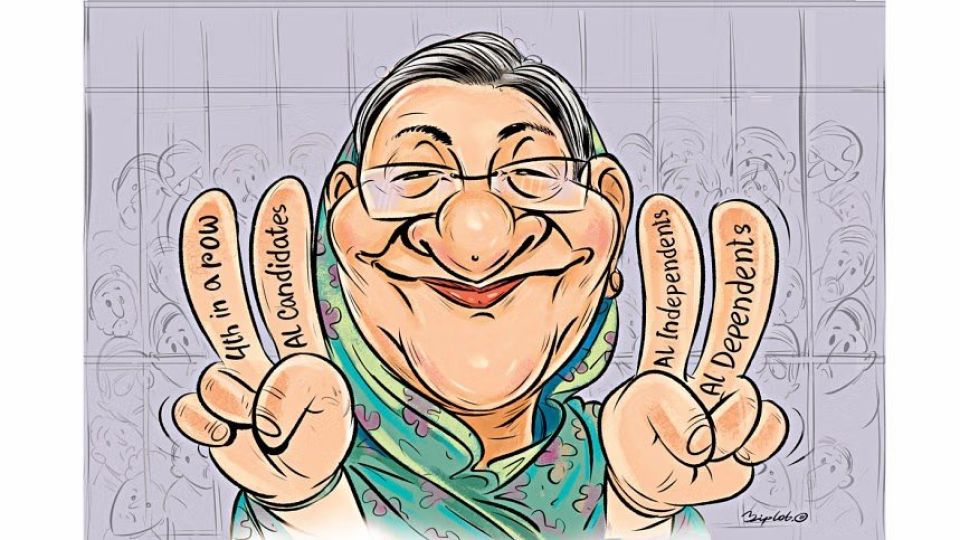January 8, 2024
DHAKA – As predicted, Awami League has won a record fourth straight term in an election that saw the second lowest voter turnout since the restoration of democracy in 1991.
The turnout was 27.15 percent at 3:00pm, but after voting closed at 4:00pm, the Election Commission estimated the final tally could stand at around 40 percent, a 13 percent jump in an hour.
The 2018 election, dubbed as a “night-time election,” saw more than 80 percent vote cast.
The turnout in the controversial February 1996 polls was 26.5 percent, the lowest in Bangladesh’s history.
Unofficial results from the Election Commission as of 3:00am today show 162 AL picks and 50 AL independents have won the race.
At least three state ministers and 14 incumbent MPs lost heavy defeat at the hands of the rivals from their own party.
Jatiya Party bagged 11 seats, while AL’s alliance partners Workers Party and Jatiya Samajtantrik Dal (JSD-Inu) one each.
With this win, Sheikh Hasina is poised to become the longest serving prime minister in Bangladesh since independence. Earlier, she was prime minister from 1996-2001.
Following BNP’s boycott threat in the lead-up to the election, the Hasina administration undertook a series of strategies that allegedly include creating pressure and a failed attempt to cut a deal with BNP to bring it to the polls.
Subsequently, Hasina went for a tight-fisted seat-sharing with Jatiya Party and other allies, and invited essentially any and all her party leaders and activists to join the race as independent candidates in efforts to make the election look participatory and competitive.
As part of the deal, AL gave up 26 seats for JP and six for its 14-party alliance partners. Of the six, three went to JSD, two to Workers Party and one to Jatiya Party (Manju).
Within hours after voting began yesterday, 11 JP candidates withdrew from the race, alleging widespread vote rigging. In total, 43 candidates of the party officially quit the polls. Besides, more than 200 of its candidates unofficially pulled out, saying the election was “one-sided and staged.”
Voters showed little interest as the outcome of the polls — basically a race between Awami League candidates and Awami League “independents” — had long been known.
Across the country, presence of voters was noticeably thin with many election centres hardly seeing any queue throughout the day.
In many centres, election officials and polling agents sat idly with very little to do, as seen by 76 journalists of The Daily Star who covered more than 350 centres in 37 districts, including Dhaka, Mymensingh, Chattogram, Khulna, Barishal, Rajshahi, Rangpur and Sylhet.
In the capital and elsewhere, the ruling party candidates arranged food and transport for voters, who still did not turn up in numbers as expected.
However, a good number of seats saw a significant turnout as the AL nominated candidates and AL independents fought neck-and-neck. In some cases, some heavyweight AL picks were blown away by their party colleagues who ran as independents, many of whom are sitting MPs.
Sporadic incidents of violence were reported in different districts, leaving one person dead in Munshiganj and many others injured in other places.
Separately, an assistant presiding officer in Gazipur died of “heart attack” while on duty.
Ruling party supporters were seen frequenting the polling centre areas in many places while some were even seen inside the booths. Voting in seven of the 42,000 polling stations across 299 seats were suspended due to irregularities.
International reactions are yet to come. However, a few foreign observers lauded the election process and arrangements for voting, saying the polls were by and large free and fair.
The voting was held amid repeated calls from the US and some other Western nations for a free and fair election. In September last year, the US announced sanctions on some individuals for undermining the voting process, and warned of further sanctions on the same grounds.
AL General Secretary Obaidul Quader has termed yesterday’s voting “a victory of democracy and people of the country”.
“The election was held in a free, fair and peaceful manner overcoming many obstacles. They [BNP] wanted to confuse the international and national friends of Bangladesh by spreading propaganda,” he said.
BNP, which enforced a hartal yesterday, did not give an immediate official reaction, saying it will come up with one today.
But the party’s Standing Committee Member Abdul Moyeen Khan said their boycott proved to be successful.
“The countrymen have refrained from casting their votes. Even Awami League supporters did not go to the polling centres,” he told reporters at his Gulshan residence after polling ended.
BNP had been waging a movement to topple the government and force it to install a neutral administration to oversee the election, but the government snubbed the demand as unconstitutional.
BNP’s street programmes ended in a whimper on October 28, when police foiled its Dhaka rally following clashes between BNP and AL activists, some of whom were joined in by law enforcers.
The government then quickly launched a countrywide crackdown on opposition leaders and supporters.
By the time the nation went to polls yesterday, more than 27,000 BNP leaders and activists were rounded up and over 1,700 were sentenced to jail in political cases in just about two months.


